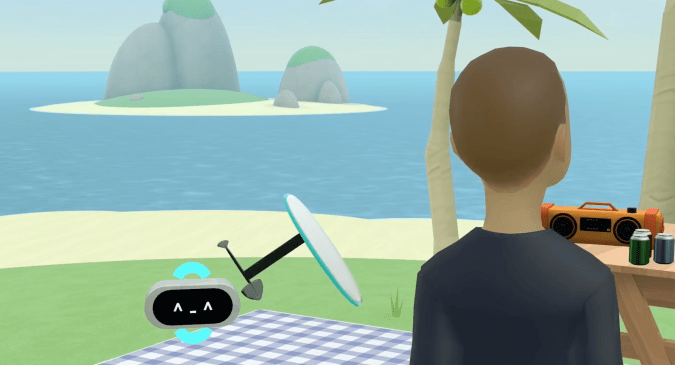Meta shows an AI bot that allows users to create VR worlds in the metaverse using voice
Okay, we know that Mark Zuckerberg has been really re-orienting his efforts into Meta (the rebranding strategy of Facebook the company is a part of that), and now, Engadget reports about a new tool the company is building for the metaverse.
Meta building an AI-powered bot for the metaverse
The metaverse, for those of you who might be unfamiliar, is what Zuckerberg seems to think the future of social media (or more broadly, tech) will reportedly be. It is a virtual reality where people use avatars to represent themselves and interact with a virtual reality world. Now, the Meta CEO just showed off a new technology that will be crucial for the company’s plans on creating an immersive virtual reality environment. The researchers of the tech giant are working on a voice-powered bot that allows users to modify their virtual environments with voice commands.
Zuckerberg also gave a demo of an early version of the concept. The tech is called Builder Bot, and it was presented during a virtual event on the company’s latest AI research.
Basically, what the Builder Bot should do is allow users to describe a world and then it would generate aspects of that world. In the demo, Zuckerberg and another Meta employee created a basic beach scene with a picnic table and clouds and added some sound effects of seagulls and ocean waves.
Of course, as you might imagine, this specific technology is still in a relatively early stage. The environment that Zuckerberg generated using voice commands was quite lower-res in comparison to other metaverse demos, and it looked much flatter. His legless avatar was still present like other demos though.
The Meta CEO explained that as this tech advances, it will allow users to create nuanced worlds with just their voices.
This Builder Bot is a part of a larger AI project for the metaverse, dubbed Project CAIRaoke. It aims to create a conversational AI for the creation of virtual worlds. This project, according to Zuckerberg, is central to his metaverse visions.
“In the metaverse, we’re going to need AI that is built around helping people navigate virtual worlds as well as our physical world with augmented reality,” he said, adding that with glasses on people’s faces, it will be the first time than an AI system could be able to “really see the world from our perspective”.
It seems that the rebranding and the overall change of direction are proving to be costly for the tech giant, as an earlier report indicated Facebook has been losing money and users for the first time ever. On the other hand, Meta’s VR platform Horizon has been expanding to more users.
Horizon virtual reality world is growing, but it is uncertain whether it will be the growth Meta needs
We recently reported that currently, Meta’s highest-profile bet is the social VR platform for the Quest headset, called Horizon Worlds. Zuckerberg called it the “core to our metaverse vision” during a virtual Meta all-hands call. Additionally, during the same call, the company’s chief product officer, Chris Cox, announced some pretty substantial numbers in an update about Horizon’s user growth.
In fact, the user base of Horizon Worlds has grown tenfold since early December. It was rolled out to all Quest users in the US and Canada, and its user base is now up to 300,000 people. This number includes users of Horizon Worlds and Horizon Venues (a conferencing VR platform), Meta spokesperson Joe Osborne confirmed.
However, it’s been only a few months since the platform was made widely available, so it seems it’s too early to tell if this rapid growth will continue and whether these users will remain on Horizon Worlds over time.
For all the latest Technology News Click Here
For the latest news and updates, follow us on Google News.

